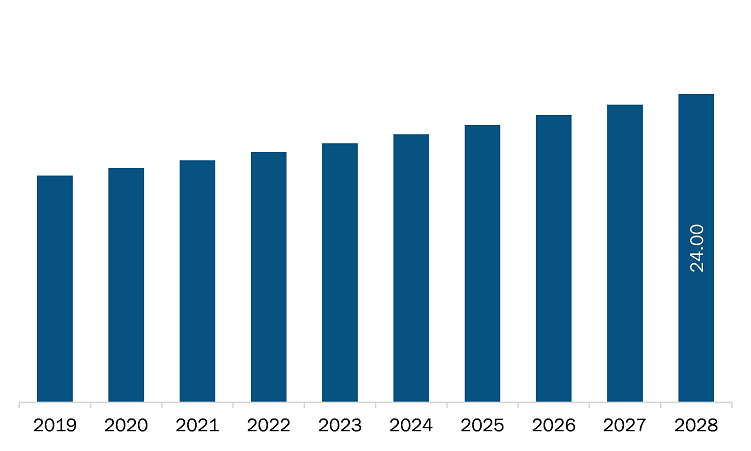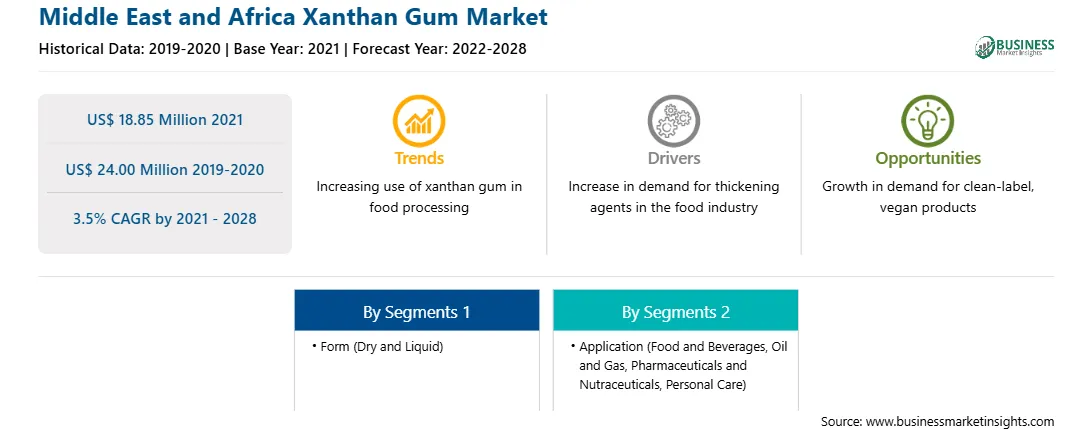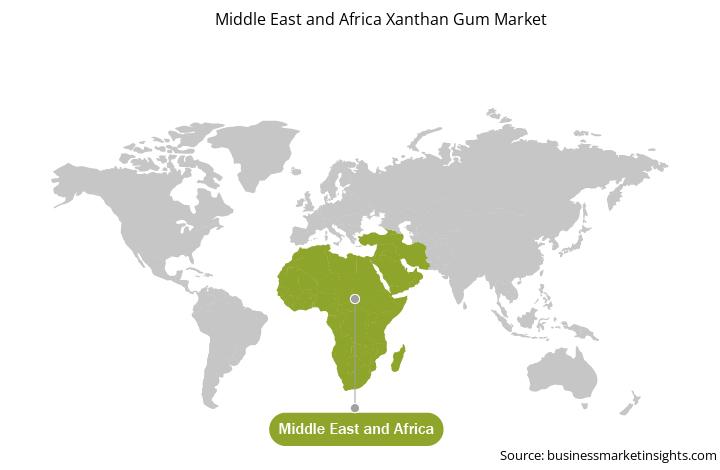The xanthan gum market in the Middle East & Africa is further segmented into South Africa, Saudi Arabia, the UAE, and the Rest of the Middle East & Africa. This region is witnessing a shift in socioeconomic condition owing to rapid economic development and rising disposable incomes. The large-scale influence of western food habits, especially on the young population, and hectic work schedules are the factors bolstering the demand for convenience food in the region. There is a huge demand for xanthan gum in dairy and frozen desserts, bakery products, chocolate confectionery products, oil and gas, personal care, and others due to the rise in urban population and growing preference for quick as well as healthy meal or snack options coupled with rising demand from other industries. Moreover, a large consumer preference for confectioneries and baked food items, including packaged products, has led to the rise in demand for xanthan gum in the Middle East & Africa. The modern lifestyle has led to changes in the buying behavior and shopping style of consumers.
In the Middle East & Africa, South Africa had the most COVID-19 cases, followed by Saudi Arabia and the United Arab Emirates. Various companies have remained closed as a result of lockdowns, resulting in a decrease in the production and distribution activities. Slowdown in the demand from various end user industries is negatively impacting the market growth across the region. However, implementation of effective government policies in countries like the UAE have significantly revived the industrial activities across the region which is projected to favor the growth of xanthan gum market in the Middle East & Africa.

Strategic insights for the Middle East and Africa Xanthan Gum provides data-driven analysis of the industry landscape, including current trends, key players, and regional nuances. These insights offer actionable recommendations, enabling readers to differentiate themselves from competitors by identifying untapped segments or developing unique value propositions. Leveraging data analytics, these insights help industry players anticipate the market shifts, whether investors, manufacturers, or other stakeholders. A future-oriented perspective is essential, helping stakeholders anticipate market shifts and position themselves for long-term success in this dynamic region. Ultimately, effective strategic insights empower readers to make informed decisions that drive profitability and achieve their business objectives within the market.

| Report Attribute | Details |
|---|---|
| Market size in 2021 | US$ 18.85 Million |
| Market Size by 2028 | US$ 24.00 Million |
| Global CAGR (2021 - 2028) | 3.5% |
| Historical Data | 2019-2020 |
| Forecast period | 2022-2028 |
| Segments Covered |
By Form
|
| Regions and Countries Covered | Middle East and Africa
|
| Market leaders and key company profiles |
The geographic scope of the Middle East and Africa Xanthan Gum refers to the specific areas in which a business operates and competes. Understanding local distinctions, such as diverse consumer preferences (e.g., demand for specific plug types or battery backup durations), varying economic conditions, and regulatory environments, is crucial for tailoring strategies to specific markets. Businesses can expand their reach by identifying underserved areas or adapting their offerings to meet local demands. A clear market focus allows for more effective resource allocation, targeted marketing campaigns, and better positioning against local competitors, ultimately driving growth in those targeted areas.

The xanthan gum market in Middle East & Africa is expected to grow from US$ 18.85 million in 2021 to US$ 24.00 million by 2028; it is estimated to grow at a CAGR of 3.5% from 2021 to 2028. Xanthan gum is used as a thickener, stabilizer, gelling agent, fat replacer in various applications such as food & beverages, pharmaceuticals and nutraceuticals, personal care, and others. Xanthan gum is used as a thickening ingredient in toothpaste and other products to keep them uniformly thick. It has been widely used as a viscosity for drilling, drill-in, and completion fluids in the oil industry because of its unusual rheological qualities. Xanthan gum is used as an emulsifier to bind moisture, and it can prevent products from separating. As a result, it is used in various oil-based salad dressings and cosmetics. Further, xanthan gum is added to improve texture, consistency, flavor, shelf life, and appearance in food products. It also helps to stabilize meals, allowing them to survive a range of temperatures and pH levels. It keeps meals from separating and will enable them to flow freely out of their containers. Furthermore, several personal care and beauty products contain xanthan gum. It allows these products to be thick while still freely flowing out of their containers. It also enables the suspension of solid particles in liquids. In addition, xanthan gum is utilized in a wide range of industrial products because of its capacity to endure varying temperatures and pH levels, attach to surfaces, and thicken liquids while maintaining a good flow. Xanthan gum has been associated with a variety of other potential health benefits, including weight loss, cancer-fighting abilities, , and lowering cholesterol levels. Additionally, in medicine, xanthan gum is utilized as a stabilizer in various formulations and suspensions such as vitamin supplements to prevent delamination due to temperature changes. Moreover, xanthan gum is also employed in certain eye drops for preventing and treating ophthalmic disorders like retinitis and choroiditis. Increasing usage of natural gums in various pharmaceutical formulations. Thus, the multi-functionality of xanthan gum is expected to drive the gum market worldwide.
In terms of form, the dry segment held a larger share in 2020. Based on application, food and beverages segment held the largest share in 2020.
A few major primary and secondary sources referred to for preparing this report on the xanthan gum market in Middle East & Africa are company websites, annual reports, financial reports, national government documents, and statistical database, among others. Major companies listed in the report are ADM; Cargill, Incorporated; CP Kelco; Deosen; FUFENG GROUP; HEBEI XINHE BIOCHEMICAL CO. LTD; Ingredion Incorporated; and Solvay among others.
The Middle East and Africa Xanthan Gum Market is valued at US$ 18.85 Million in 2021, it is projected to reach US$ 24.00 Million by 2028.
As per our report Middle East and Africa Xanthan Gum Market, the market size is valued at US$ 18.85 Million in 2021, projecting it to reach US$ 24.00 Million by 2028. This translates to a CAGR of approximately 3.5% during the forecast period.
The Middle East and Africa Xanthan Gum Market report typically cover these key segments-
The historic period, base year, and forecast period can vary slightly depending on the specific market research report. However, for the Middle East and Africa Xanthan Gum Market report:
The Middle East and Africa Xanthan Gum Market is populated by several key players, each contributing to its growth and innovation. Some of the major players include:
The Middle East and Africa Xanthan Gum Market report is valuable for diverse stakeholders, including:
Essentially, anyone involved in or considering involvement in the Middle East and Africa Xanthan Gum Market value chain can benefit from the information contained in a comprehensive market report.